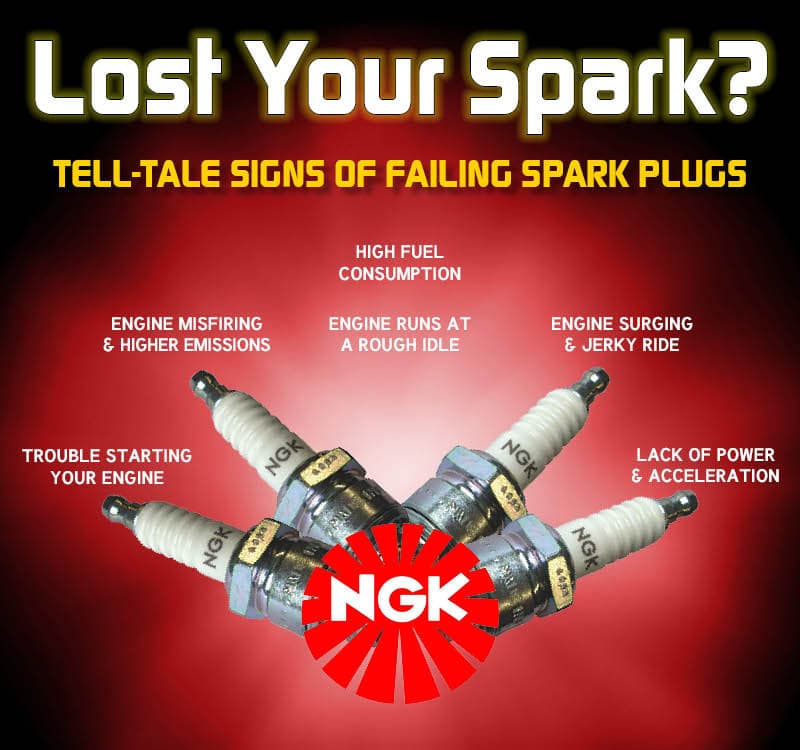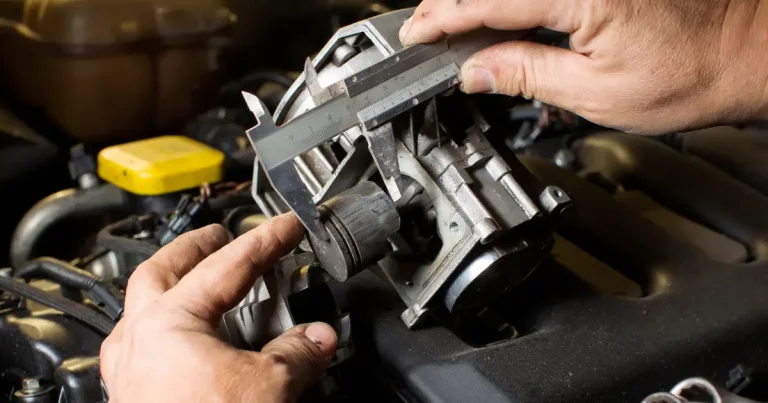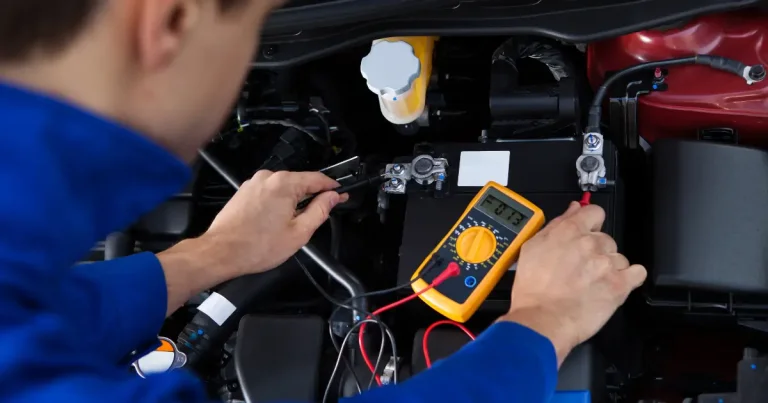Symptoms of bad spark plugs include engine misfires, rough idling, and difficulty starting. Poor acceleration and increased fuel consumption are also common indicators.
What are the Symptoms of Bad Spark Plugs?
Spark plugs play a crucial role in a vehicle’s ignition system. They are responsible for igniting the air-fuel mixture within the engine’s combustion chambers, enabling the vehicle to start and run smoothly. Over time, spark plugs wear out or become fouled, leading to various performance issues.
Recognizing the symptoms early can prevent further engine complications and costly repairs. Regular maintenance and timely replacement of spark plugs ensure optimal engine performance and fuel efficiency. It’s important for vehicle owners to be aware of these symptoms as they directly relate to engine health and vehicle performance.

Credit: www.kaufmansautorepairs.com
Importance Of Spark Plugs In Engine Performance
The heart of your car’s performance lies in a potent spark. Spark plugs may be small, but their role is mighty. Without them, your engine can’t start or run smoothly. They are the tiny titans that ignite the fuel-air mix, powering your ride down the road.
The Role Of Spark Plugs In Engine Combustion
Every turn of the key depends on spark plugs for a seamless start. These plugs create the necessary spark to ignite the engine’s air-fuel mixture. This ignition is what makes the engine produce power. Without a strong spark, your car struggles to perform.
Consequences Of Failing Spark Plugs
- Starting troubles: A reluctant start is often the first sign of wear.
- Engine misfires: A stutter or halt in power when you expect smooth acceleration.
- Reduced fuel efficiency: More trips to the gas station can hint at spark plug issues.
| Signs of Bad Spark Plugs | |
|---|---|
| Rough idling | Noise and vibration when your vehicle is at rest. |
| Poor acceleration | A sense of sluggishness when pressing the gas pedal. |
| Increased emissions | More pollutants coming out of your tailpipe. |
In essence, spark plugs may be small but they are significant for engine performance. Keep an ear out for odd noises and an eye on your car’s behavior. Regular checks can save you from big problems.
Identifying Faulty Spark Plugs
Spark plugs ignite the fuel in your engine, but when they fail, your ride suffers. Spotting bad spark plugs early keeps your vehicle healthy. Learn the signs and keep your engine purring.
Visual Inspection Cues
Eyeing up your spark plugs offers clues to their health. Pull them out and look for:
- A sooty or carbon-fouled tip: Too much oil, not enough spark.
- Oil or ash on the electrodes: May signal oil leaks or poor fuel quality.
- Worn electrodes: They should be flat and even.
- Damage or cracks: Physical damage is a bad sign.
Symptoms During Vehicle Operation
Bad spark plugs tell tales through your vehicle’s behavior./p>
- Rough idling: The engine shakes or sounds wrong.
- Hard starts: Struggling to wake up says something’s amiss.
- Acceleration hiccups: Jittery when you step on it.
- Poor fuel economy: Guzzling more than normal.
- Misfires: Sudden jerks or pauses in power.
Common Symptoms Of Worn Spark Plugs
Spark plugs are vital for a smooth-running engine. Like all parts, they wear out over time. Recognizing worn spark plug symptoms helps prevent engine issues. Let’s explore these symptoms in detail.
Engine Misfires And Hesitation
The engine may misfire or hesitate when you press the gas pedal. This is a classic sign of spark plug trouble. A misfiring engine results in uneven power and can cause acceleration to feel jerky. The main reasons include:
- Faulty spark plug wires
- Corroded plug terminals
- Insufficient spark plug gap
These issues may lead to incomplete combustion. Incomplete combustion wastes fuel and raises emissions. If your engine stumbles when you accelerate, check your spark plugs.
Rough Idling And Stalling
Rough idling feels like a bumpy ride even when the car sits still. It’s when your car vibrates or shakes abnormally. Stalling is when the engine stops running unexpectedly. These issues might mean your spark plugs need attention. Signs include:
- Irregular engine sounds
- Weak engine performance
- Unexpected engine shut off
Rough idling and stalling can add stress to your engine. They can reduce fuel efficiency and may lead to costly repairs. Prevent this by regularly checking your spark plugs.

Credit: m.youtube.com
Fuel Efficiency And Spark Plugs
Did you know spark plugs are vital for your car’s fuel economy? A car uses air and fuel to run. Spark plugs ignite this mix. They age with time. Older spark plugs can hurt your mileage.
Decreased Fuel Economy
Fuel consumption can tell a lot about a vehicle’s health. When spark plugs don’t work well, your car gulps more fuel. This can lead to more fill-ups at the gas station.
- Bad spark plugs fail to ignite fuel efficiently.
- Engines work harder, using more gas.
- Mileage goes down; expenses go up.
A single misfire can waste fuel. Over time, these misfires add up. This means more fuel is used for every trip.
How Bad Spark Plugs Affect Gas Mileage
Imagine a little part in your car making a big difference.
| Car Part | Function | Effect on Mileage |
|---|---|---|
| Good Spark Plug | Ignites fuel efficiently | Better mileage |
| Bad Spark Plug | Struggles to ignite fuel | Poorer mileage |
Replacing spark plugs can bring back lost efficiency. Your car will use the correct amount of fuel. This is one small step for a car, a giant leap for fuel economy.
- Check your manual for spark plug lifespan.
- Notice if your car uses more gas than before.
- Get a professional to check your spark plugs.
Don’t overlook these hidden heroes of fuel savings. Take care of the spark plugs. Enjoy a smooth and efficient ride.
Starting Troubles
Spark plug health is crucial. It ensures a smooth-running engine. When spark plugs fail, starting your car can become a nightmare. The troubles might begin subtly but can escalate quickly. Let’s explore how bad spark plugs can lead to starting troubles, especially during cold starts.
Difficulty In Starting The Engine
One clear sign of bad spark plugs is difficulty in starting the engine. This issue is often mistaken for a dead battery or a failing starter motor. However, when spark plugs are worn out, they can’t create the necessary spark to ignite the fuel-air mixture in the combustion chamber. This leads to the engine struggling to turn over, causing frustrating delays when you’re ready to hit the road.
The Link Between Cold Starts And Spark Plug Health
Starting an engine in cold weather is already a challenge. Cold engines require more power to get going. If spark plugs are in poor condition, this task becomes even harder. Damaged or worn-out spark plugs fail to provide the strong spark needed to ignite the engine when temperatures drop. This can result in the engine stuttering or failing to start on a chilly morning. Keeping spark plugs in tip-top shape avoids this predicament.
Performance Issues At High Speeds
Your car’s performance on the highway can tell you a lot about its health. Bad spark plugs can be a sneaky culprit behind some performance problems you might face while driving at high speeds. Let’s drive into some common symptoms that could indicate your spark plugs need attention.
Lack Of Acceleration
Struggling to pick up speed? This may be a sign of worn spark plugs. When you press the gas pedal, you expect a quick response. If there’s a delay or lack of power, your engine isn’t firing as it should. Here’s what you might notice:
- Sluggish response to the accelerator
- Difficulty maintaining high speeds on the freeway
- Car feels slower to respond during overtaking
Engine Surging And Power Loss
Imagine you’re cruising smoothly and suddenly, your car jerks or hesitates. This might be an engine surge. It’s like your car can’t decide whether to speed up or slow down. This inconsistency can point to bad spark plugs. Typical symptoms include:
- Unexpected jerking or surging at constant highway speeds
- The engine stutters before returning to normal
- A sensation of power loss in the midst of acceleration
Poor spark plug health can lead to bigger problems if not addressed. It’s essential to check these components regularly for a smooth and safe ride.
The Sound Of Engine Misfiring
An engine’s misfire is like a cough or sputter that you can hear and feel. These interruptions in the regular firing pattern can signal serious spark plug issues. Healthy engines hum along smoothly, but misfires disrupt this harmony. Let’s tune into this problematic symphony and uncover what your car is trying to tell you.
Detecting Unusual Noises
Your vehicle’s engine typically runs with a consistent rhythm. When spark plugs go bad, this rhythm is thrown off. You might hear distinct rattles, pops, or spitting sounds that weren’t there before. These are not just random noises; they are cries for help from your engine. Ignoring these peculiar sounds can lead to more damage and costly repairs.
How Misfires Relate To Spark Plug Problems
Spark plugs ignite the fuel in your engine. When they fail, misfires occur. This is because the spark is either weak or nonexistent. Misfires mean the engine is not running at full capacity. You’ll feel a jolt or hesitation when accelerating. This can hurt your car’s performance and even its fuel economy. Here’s a quick list of signs that suggest the need to check your spark plugs:
- Rough idling
- Struggling acceleration
- Higher fuel consumption
- Engine surging or hesitating
Physical Symptoms And Warnings
Physical symptoms and warnings are key indicators of your vehicle’s health, much like a cough or fever signals a cold. Your car relies on spark plugs for a clean start and smooth operation. Ignoring these signs can lead to larger problems. Let’s identify critical symptoms that point to bad spark plugs.
Odor And Exhaust Smoke Explained
A troubling sign of spark plug issues is an unusual odor. A rich fuel smell could signify spark plugs failing to ignite the fuel mixture efficiently. This unburnt fuel exits as exhaust smoke. If you notice blue or black smoke, it’s time for a closer inspection.
Oil On Spark Plug: Causes And Effects
Oil on your spark plugs is a serious concern. It may indicate a leaking gasket or worn engine parts. The effects are immediate and debilitating for your car’s performance. Expect misfires, reduced fuel economy, and potential engine damage.
- Engine misfires lead to erratic performance and starting troubles.
- Reduced fuel economy strains your wallet with frequent gas stops.
- Potential engine damage could mean costly repairs or replacements.
Preventive Measures And Maintenance Tips
Proper maintenance and timely replacement of spark plugs are crucial. Regular checks can prevent car issues. These preventive measures ensure vehicle reliability and longevity. Implementing maintenance tips keeps your engine running smoothly.
Regular Spark Plug Checks
Consistent inspection of spark plugs helps spot problems early. Here’s what to do:
- Examine spark plug for wear and tear.
- Look for deposits or damage.
- Check for the proper gap.
When To Replace Spark Plugs
Know the right time to change spark plugs:
| Mileage | Action |
|---|---|
| 30,000 miles | Inspect |
| 60,000-90,000 miles | Replace |
Mileage milestones serve as a guide. Yet, always refer to the user’s manual for specific intervals.
Regular maintenance keeps engines healthy. Replace old spark plugs based on manufacturer instructions. This simple step can enhance fuel efficiency and engine performance.

Credit: www.speedcraftacura.com
Diagnosing Spark Plug Issues
Spark plugs are vital for your engine’s performance. They ignite the air and fuel mixture, giving your vehicle the power it needs to run. When they fail, your car might experience a range of symptoms. Recognizing these signs ensures timely maintenance. This will improve your car’s health. Let’s delve into the tools needed and decide whether to seek professional help or handle the replacement yourself.
Tools For Spark Plug Diagnosis
To confirm if your spark plugs need attention, certain tools can help:
- Spark plug socket – Fits snugly around the plug
- Ratchet wrench – Turns the spark plug socket
- Extension bar – Reaches deep plug positions
- Feeler gauge or spark plug gap tool – Measures electrode gaps
- Ohmmeter – Tests electrical resistance
Checking the gap and inspecting for wear or buildup can signal when a change is due. An ohmmeter can test if a plug is failing to conduct electricity.
Professional Vs. Diy Spark Plug Replacement
| Professional Replacement | DIY Replacement |
|---|---|
|
|
Choosing between professional or DIY spark plug replacement depends on skill and confidence. For modern engines that are complex, a professional might be safer. If you have the right tools and basic knowledge, a DIY approach can save money. Always ensure you consult the vehicle’s manual. This guarantees the correct spark plugs are used for optimal engine performance.
Conclusion
Recognizing the signs of failing spark plugs is crucial for vehicle maintenance. Timely replacement can prevent engine issues and ensure optimal performance. Keep an eye out for misfires, rough idling, and poor acceleration. Addressing these symptoms promptly means safeguarding your car’s health and avoiding costlier repairs down the road.
Remember, your engine relies on strong spark plugs to run smoothly.
Best for Cleaning Leather Car Seats: Top Solutions for Ultimate Shine!




